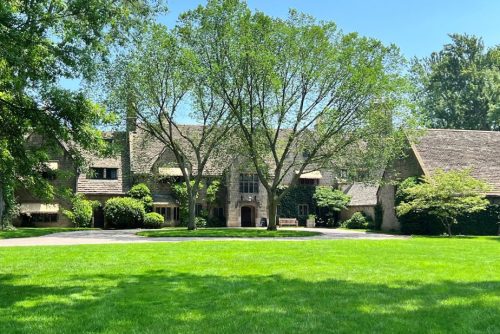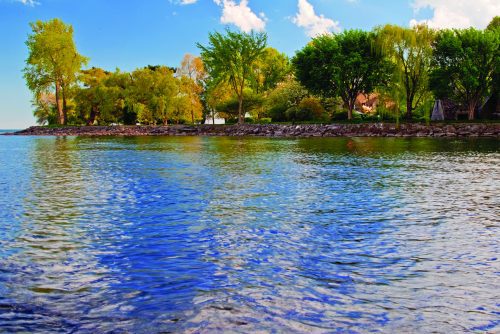Ford House teams up with state and federal agencies to restore Ford Cove
GROSSE POINTE SHORES, Michigan (Jan. 26, 2021) — Ford House, the historic estate of Edsel and Eleanor Ford, is teaming up with the Great Lakes Commission (GLC) and the National Oceanic and Atmospheric Administration (NOAA) for a project to restore disappearing wildlife habitats along the shoreline of Ford Cove on Lake St. Clair — part of Michigan’s Great Lakes waterway. Dubbed the Ford Cove Shoreline and Coastal Wetland Restoration Project, the goal is to transform Ford House’s lakeshore back to its natural state.
The Ford Cove restoration will span roughly a mile of Lake St. Clair’s coastline and more than 17 acres of the surrounding coastal marsh, nearshore habitat and adjacent forested wetlands. The plan includes removing hard, non-natural coastal features like broken concrete and seawalls and reintroducing native plant species and softer shorelines. This will reduce the heavy waves that disrupt vital habitats that local fish, waterfowl, mussels, turtles, snakes and other wildlife need to raise their young, find cover and forage for food — all supporting the lake’s greater ecosystem.

The project kicks off this spring with an initial feasibility study to evaluate the plan put together by Ford House and GLC, along with the Michigan Department of Natural Resources Fisheries Division, and Macomb County’s Planning and Economic Development Department, Parks and Natural Resources Division. The project team selected Michigan-based community advancement firm OHM Advisors to execute the study, lasting about 18 months. OHM Advisors specializes in architecture, engineering, planning, urban design and landscape architecture, surveying and construction engineering.
“Ninety-nine percent of Lake St. Clair’s shoreline is not in its original condition, so Ford House will be recreating the natural world, and that’s an exciting process. After the study is complete, we will get to make Ford House’s shores and wetlands a more functional part of the natural community,” said Kevin Drotos, Ford House Invasive Species and Woodland Specialist.
Ford Cove presents a uniquely ideal location for a shoreline restoration of this scale, as a large swath of continuous shoreline privately owned by Ford House. Natural habitats along the shoreline in Macomb County have nearly disappeared because of industry and significant development of lakefront property. The 31 1/2 miles of shoreline in the county hold 10,000 boat slips and 50 marinas, leaving only 2,140 linear feet of natural shores.
Ford House places a high priority on environmental sustainability, an extension of the museum’s mission to maintain and restore the Fords’ historic home and grounds as a National Historic Landmark. Two Ford House staff — Ford House Director of Landscapes Karl Koto and Drotos — have teamed up with the GLC to lead the project.
“Roughly 200 species of birds use Ford Cove and the land around it. When we restore the shoreline, the birds can have access to the native plants we add, and the insects that live on them. The fish and other aquatic species will be able to thrive,” Drotos said. “All these things benefit the ecosystem. Ford House is taking an interest in the health of the environment, hand-in-hand with caring for the estate’s history and landscapes.”
The current step of the project, the feasibility study, will include detailed baseline chemical, geotechnical, and ecological evaluations, preliminary hydrologic and hydraulic modeling, and produce conceptual plans with estimated costs and restoration recommendations. These measures will determine if the plan will be able to effectively reach its restoration goals.
“The Ford Cove project has the potential to benefit numerous important species native to the Great Lakes, as well as some federally protected species like freshwater mussels,” said Erika Jensen, interim executive director of the GLC. “We’re pleased to be working with Ford House and continuing our partnership with NOAA to restore this and other priority sites across the Great Lakes basin.”
The cost of the feasibility study is $230,634, including a $3,000 in-kind match from Ford House.
Funding for this project comes from the Great Lakes Restoration Initiative through a regional partnership between NOAA and the GLC. A project management team provides input and guidance on the project and includes members from the GLC, Ford House, NOAA, Macomb County, the Michigan Department of Natural Resources Fisheries Division, and the Michigan Department of Environment, Great Lakes, and Energy.
# # #
About Ford House
Ford House is located at 1100 Lake Shore Road in Grosse Pointe Shores. Since 1978, Ford House has welcomed hundreds of thousands of visitors to share in Eleanor Ford’s vision of preserving the estate for future generations to enjoy through interpretive tours, family activities, lectures, exhibits and gardens and grounds events. For more information, visit www.fordhouse.org or call 313-884-4222 and connect with Ford House on Facebook, Instagram (@eefordhouse) and Twitter (@fordhouse).
About the Great Lakes Commission
The Great Lakes Commission is a binational government agency established in 1955 to protect the Great Lakes and the economies and ecosystems they support. Its membership includes leaders from the eight U.S. states and two Canadian provinces in the Great Lakes basin. The GLC recommends policies and practices to balance the use, development, and conservation of the water resources of the Great Lakes and brings the region together to work on issues that no single community, state, province or nation can tackle alone.
About the National Oceanic and Atmospheric Administration
NOAA’s mission is to understand and predict changes in the Earth’s environment, from the depths of the ocean to the surface of the sun, and to conserve and manage our coastal and marine resources.
About the Macomb County Planning and Economic Development Department, Land and Water Resources Division
Macomb County’s Land and Water Resources Division is committed to sustainability through environmental stewardship, developing and fostering economic development for water-based businesses and enhancing the quality of life for residents and visitors. Through the protection and restoration of Macomb County’s natural resources, the Land and Water Resources Division will achieve these goals while also improving water quality, water access and water attraction.





